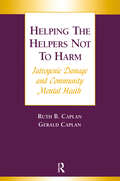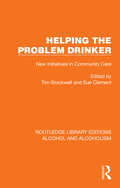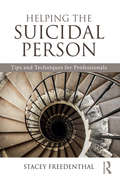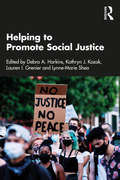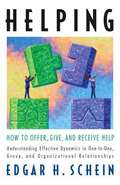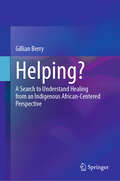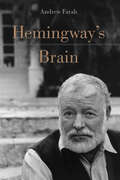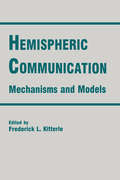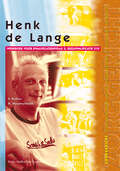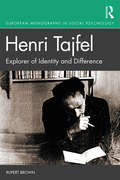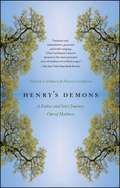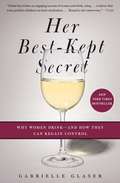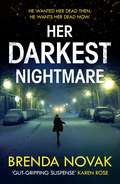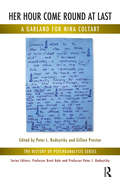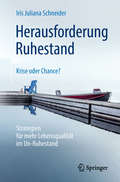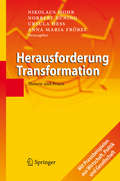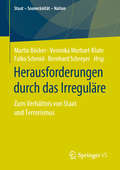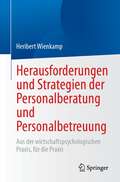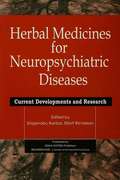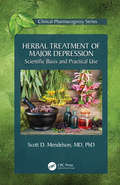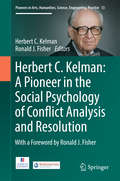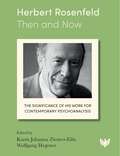- Table View
- List View
Helping the Helpers Not to Harm
by Gerald Caplan Ruth B. CaplanThe authors of this controversial volume have collected case studies and observational accounts of caregivers for over 15 years. Iatrogenic harm is a serious and widespread problem that many have been reluctant to speak out about for fear of being blacklisted by their colleagues. In writing this book the authors hope to establish guidelines that will help caregivers to recognize and deal with potentially harmful behavior thereby improving the standards of care for all patients.
Helping the Problem Drinker: New Initiatives in Community Care (Routledge Library Editions: Alcohol and Alcoholism)
by Tim StockwellOriginally published in 1987, Helping the Problem Drinker addressed the realisation that only a small proportion of problem drinkers ever contacted existing treatment agencies, and that therefore a more comprehensive community-oriented approach should be developed. This included training of primary care health workers and the development of multidisciplinary Community Alcohol Teams. At the time other community-based initiatives such as self-help groups for early problem drinkers and early intervention programmes in general practice and general hospitals, had been implemented. This book draws together what had been learned about these new developments, a number of which had now been evaluated. The book will still be of interest to all planners and professional staff concerned with alcohol problems: both specialists and non-specialists in general medicine, psychiatry, psychology and the social services.
Helping the Suicidal Person: Tips and Techniques for Professionals
by Stacey FreedenthalHelping the Suicidal Person provides a highly practical toolbox for mental health professionals. The book first covers the need for professionals to examine their own personal experiences and fears around suicide, moves into essential areas of risk assessment, safety planning, and treatment planning, and then provides a rich assortment of tips for reducing the person’s suicidal danger and rebuilding the wish to live. The techniques described in the book can be interspersed into any type of therapy, no matter what the professional’s theoretical orientation is and no matter whether it’s the client’s first, tenth, or one-hundredth session. Clinicians don’t need to read this book in any particular order, or even read all of it. Open the book to any page, and find a useful tip or technique that can be applied immediately.
Helping to Promote Social Justice
by Debra A. Harkins; Kathryn J. Kozak; Lauren I. Grenier; Lynne-Marie SheaHelping to Promote Social Justice is a richly informed and practical guide for advanced students and young professionals to become helpers capable of promoting social justice with whomever they collaborate with, mentor, serve and consult. Filled with insight and supplemental exercises, the book will direct readers to think critically and reflect on the broader social and political systems that create our current social injustices. Beginning with a strong theoretical focus on power, social identity and intersectionality, the authors engage with readers’ assumptions on helping, their value systems and their understandings of power and privilege when helping communities in need. The rest of the book focuses on the application of these critical concepts, guiding future helpers to consider how to intervene, assess need, lead, build a team, address conflict and work to promote change from a position of social justice. Written by academic faculty with expertise in teaching, coaching and consulting, Helping to Promote Social Justice should be considered essential reading for students in social work, psychology and counselling.
Helping: How to Offer, Give, and Receive Help
by Edgar H. ScheinIn this seminal book on helping, corporate culture and organizational development guru Ed Schein analyzes the dynamics of helping relationships, and explains why help is often not helpful.
Helping: Resources To Improve Emotional Health And Strengthen Relationships (Childrens Safety Ser.)
by Linda Johns Lisa Fox Janine ScottNIMAC-sourced textbook
Helping?: A Search to Understand Healing from an Indigenous African-Centered Perspective
by Gillian BerryThis book exists to encourage helping professionals, particularly those at the beginning of their careers, to critically explore and understand current strategies in fields such as psychotherapy, psychology, and social work. Historical examples of helping policies and strategies used over the years are reviewed and critically evaluated as to whether they helped or hurt the communities they were designed to support. Current policies will be discussed to evaluate whether they are helping the communities they serve. In alignment with an Indigenous African-centered philosophy of holism, multi-dimensionality, and interconnectedness, this work takes a multilayered approach to storytelling by weaving together three journeys: the author&’s personal journey of exploration, the journey of the Black Girl from George Bernard Shaw&’s novella (described below), and the reader&’s. In it, the author details her understanding of the philosophical framework she learned in professional helping training programs, why she came to believe they were inadequate, and how this sparked her global search to understand how to be an effective helper. The author&’s journey is paralleled with the famous and controversial novella by George Bernard Shaw, The Adventures of the Black Girl in Her Search for God, which is a depiction of the universal search for understanding. This text contrasts this alternative perspective on helping with the dominant approaches to what constitutes &“helping.&” The protagonist's journey is mirrored by the author&’s stories of discovery, and reflective questions are designed to enable the reader&’s journey toward becoming a professional helper in the context of current systems. This text explores what helping may look like from an alternative philosophical perspective, seeking to facilitate a process that will enable people to live more satisfyingly. Each chapter offers theoretical underpinnings from an Indigenous African-centered perspective, a critique of dominant approaches to helping, and a different stage of the Black Girl and authors&’ paralleled searches for understanding about God and healing, respectively.
Hemingway's Brain
by Andrew FarahA forensic psychiatrist’s second opinion on the conditions that led to Ernest Hemingway’s suicide, “mixing biography, literature and medical analysis” (The Washington Post).Hemingway’s Brain is an innovative biography and the first forensic psychiatric examination of Nobel Prize–winning author Ernest Hemingway. After seventeen years researching Hemingway’s life and medical history, Andrew Farah, a forensic psychiatrist, has concluded that the writer’s diagnoses were incorrect. Contrary to the commonly accepted diagnoses of bipolar disorder and alcoholism, he provides a comprehensive explanation of the medical conditions that led to Hemingway’s suicide.Hemingway received state-of-the-art psychiatric treatment at one of the nation’s finest medical institutes, but according to Farah it was for the wrong illness, and his death was not the result of medical mismanagement but medical misunderstanding. Farah argues that despite popular mythology Hemingway was not manic-depressive and his alcohol abuse and characteristic narcissism were simply pieces of a much larger puzzle. Through a thorough examination of biographies, letters, memoirs of friends and family, and even Hemingway’s FBI file, combined with recent insights on the effects of trauma on the brain, Farah pieces together this compelling alternative narrative of Hemingway’s illness, one missing from the scholarship for too long.Though Hemingway’s life has been researched extensively and many biographies written, those authors relied on the original diagnoses and turned to psychoanalysis and conjecture regarding Hemingway’s mental state. Farah has sought to understand why Hemingway’s decline accelerated after two courses of electroconvulsive therapy, and in this volume explains which current options might benefit a similar patient today. Hemingway’s Brain provides a full and accurate accounting of this psychiatric diagnosis by exploring the genetic influences, traumatic brain injuries, and neurological and psychological forces that resulted in what many have described as his tortured final years. It aims to eliminate the confusion and define for all future scholarship the specifics of the mental illnesses that shaped legendary literary works and destroyed the life of a master.
Hemispheric Communication: Mechanisms and Models
by Frederick L. KitterleThe purpose of this book is to provide a comprehensive overview of the way in which the two hemispheres of the brain interact. Some chapters address the nature of this interaction, the anatomical substrates that may account for greater or lesser hemispheric interaction, and the role of sex and handedness in hemispheric interaction. Others address the use of different experimental methods and clinical populations to understand the nature of hemispheric interaction. In addition to current research, this book also provides an important historical overview of the early research questions about hemispheric function and interaction that have helped to shape current views of and approaches to the study of brain function. Special coverage includes: * a comprehensive history of early research on cerebral laterality and hemispheric communication, including work by Pavlov; * a critical analysis of techniques and methologies to study hemispheric communication; * research on anatomical substrates which may underly functional differences between hemispheres and hemispheric communication; * implications of handedness for hemispheric communication; * research on individual differences in hemispheric function; * comprehensive research on sex and handedness from physiological, anatomical, and functional perspectives; and * attentional differences in hemispheric function.
Henk de Lange
by Nicolien Van Halem D. E. Zwart S. Borkus R. Messerschmidt J. Sevenhuijsen J.H. van Meteren C.J.M. van der CingelZorgcategorie: verstandelijk gehandicaptenSetting: genormaliseerde woonvoorziening voor mensen met een verstandelijke handicapKorte inhoud: Henk de Lange woont in "De Klaver", een genormaliseerde woonvoorziening voor verstandelijk gehandicapten. Werken in zo'n woonvoorziening betekent dat je over verschillende competenties moet beschikken. Die variëren van huishoudelijke en verzorgende taken tot begeleiden en leidinggeven. Bij de oprichting van De Klaver dacht het team selfsupporting te kunnen zijn. Dat bleek, op basis van de groepssamenstelling, toch te hoog gegrepen. Nu maakt de groep gebruik van een aantal faciliteiten van de nabijgelegen zorginstelling. Toch blijft het voor het team een hele uitdaging om zo'n groot 'gezin' draaiende te houden. Van de verzorgende vraagt dit een planmatige en methodische aanpak, maar ook de nodige creativiteit.
Henri Tajfel: Explorer of Identity and Difference (European Monographs in Social Psychology)
by Rupert BrownThis book offers a biographical account of Henri Tajfel, one of the most influential European social psychologists of the twentieth century, offering unique insights into his ground-breaking work in the areas of social perception, social identity and intergroup relations. The author, Rupert Brown, paints a vivid and personal portrait of Tajfel’s life, his academic career and its significance to social psychology, and the key ideas he developed. It traces Tajfel’s life from his birth in Poland just after the end of World War I, his time as a prisoner-of-war in World War II, his work with Jewish orphans and other displaced persons after that war, and thence to his short but glittering academic career as a social psychologist. Based on a range of sources including interviews, archival material, correspondence, photographs, and scholarly output, Brown expertly weaves together Tajfel’s personal narrative with his evolving intellectual interests and major scientific discoveries. Following a chronological structure with each chapter dedicated to a significant transition period in Tajfel’s life, the book ends with an appraisal of two of his principal posthumous legacies: the European Association of Social Psychology, a project always close to Tajfel’s heart and for which he worked tirelessly; and the 'social identity approach' to social psychology initiated by Tajfel over forty years ago and now one of the discipline’s most important perspectives. This is fascinating reading for students, established scholars, and anyone interested in social psychology and the life and lasting contribution of this celebrated scholar.
Henry's Demons: Living with Schizophrenia, A Father and Son's Story
by Patrick Cockburn Henry CockburnOn a cold February day two months after his twentieth birthday, Henry Cockburn waded into the Newhaven estuary outside Brighton, England, and nearly drowned. Voices, he said, had urged him to do it. Nearly halfway around the world in Afghanistan, journalist Patrick Cockburn learned from his wife, Jan, that his son had suffered a breakdown and had been admitted to a hospital. Ten days later, Henry was diagnosed with schizophrenia. Narrated by both Patrick and Henry, this is the extraordinary story of the eight years since Henry's descent into schizophrenia--years he has spent almost entirely in hospitals--and his family's struggle to help him recover. With remarkable frankness, Patrick writes of Henry's transformation from art student to mental patient and of the agonizing and difficult task of helping his son get well. Any hope of recovery lies in medication, yet Henry, who does not believe he is ill, secretly stops taking it and frequently runs away. Hopeful periods of stability are followed by frightening disappearances, then relapses that bleed into one another, until at last there is the promise of real improvement. In Henry's own raw, beautiful chapters, he describes his psychosis from the inside. He vividly relates what it is like to hear trees and bushes speaking to him, voices compelling him to wander the countryside or live in the streets, the loneliness of life within hospital walls, harrowing "polka dot days" that incapacitate him, and finally, his steps towards recovery. Patrick's and Henry's parallel stories reveal the complex intersections of sanity, madness, and identity; the vagaries of mental illness and its treatment; and a family's steadfast response to a bewildering condition. Haunting, intimate, and profoundly moving, their unique narrative will resonate with every parent and anyone who has been touched by mental illness.
Her Best-Kept Secret: Why Women Drink-And How They Can Regain Control
by Gabrielle GlaserFor readers of Quit Like a Woman, this &“engaging account of women and drink, [cites] fascinating studies about modern stressors…and evidence that some problem drinkers can learn moderation….Bound to stir controversy&” (People).In Her Best-Kept Secret, journalist Gabrielle Glaser uncovers a hidden-in-plain-sight drinking epidemic. Using “investigative rigor and thoughtful analysis” (The Boston Globe), Glaser is the first to document that American women are drinking more often than ever and in ever-larger quantities in this “substantial book, interested in hard facts and nuance rather than hand-wringing” (The New York Times Book Review). She shows that contrary to the impression offered on reality TV, young women alone aren’t driving these statistics—their moms and grandmothers are, too. But Glaser doesn’t wag a finger. Instead, in a funny and tender voice, Glaser looks at the roots of the problem, explores the strange history of women and alcohol in America, drills into the emerging and counterintuitive science about that relationship, and asks: Are women getting the help they need? Is it possible to return from beyond the sipping point and develop a healthy relationship with the bottle? Glaser reveals that, for many women, joining Alcoholics Anonymous is not the answer—it is part of the problem. She shows that as scientists and health professionals learn more about women’s particular reactions to alcohol, they are coming up with new and more effective approaches to excessive drinking. In that sense, Glaser offers modern solutions to a very modern problem.
Her Darkest Nightmare: He wanted her dead then. He wants her dead now. (Evelyn Talbot series, Book 1) (Evelyn Talbot)
by Brenda NovakThis is SILENCE OF THE LAMBS meets Karen Rose...New York Times bestseller Brenda Novak's first novel in the in the Evelyn Talbot series, Her Darkest Nightmare, has been described by Karen Rose as 'gut-gripping suspense'. Psychiatrist Dr Evelyn Talbot thought she had experienced her darkest nightmare when she was targeted as a teenager by a killer, but she's about to find out that some nightmares return again and again...Dr Evelyn Talbot has learnt to live with fear. As a teenager she was targeted by her boyfriend, Jasper Moore, and survived days of torture. She escaped with her life, but Jasper disappeared before he could be caught.Now Evelyn Talbot lives in a world of psychopaths.As the pioneering head of the Hanover House institute in Alaska, she engages daily with killers who have no conscience, no remorse and an ever-increasing desire to murder her. Her only desire is to try and figure out why they do what they do and stop them.But when a mutilated body is found in her sleepy Alaskan town Evelyn is forced to question herself, her inmates and whether her darkest nightmare has come back to haunt her...Look for the other gripping novels in the Evelyn Talbot series - Hello Again, Face Off and the prequel novella, Hanover House, available now.
Her Hour Come Round at Last: A Garland for Nina Coltart (The History of Psychoanalysis Series)
by Peter L. Rudnytsky Gillian PrestonThis title is a celebration of the life of Nina Coltart, who had a career in medicine and psychoanalysis and was author of bestselling titles in psychotherapy The Baby and the Bathwater and How to Survive as a Psychotherapist. The book contains a large number of contributions by specialists in the field including Michael Brearley, Susan Budd and Anthony Molino. The book offers a long-overdue tribute to Nina Coltart (1927-1997), who was a leading figure in the Independent Group of the British Psychoanalytical Society and, indeed, one of the greatest psychoanalysts of the twentieth century. In addition to providing a comprehensive assessment of Coltart's life and work by patients, supervisees, friends, family members, and readers, the editors have compiled all of her hitherto unpublished or uncollected writings, making this book a capstone of her legacy to psychoanalysis.
Her Little Secret: A gripping new psychological thriller about obsessive love for 2021
by Julia StoneHis therapist. Their love affair. Her Little Secret.Cristina knows all about boundaries. As a therapist, it is vital that she keeps her clients at a professional distance.Enter new client Leon: educated, charming, affluent -- and newly bereaved, following the death of his married lover, Michelle. Cristina soon learns that Leon has an ulterior motive for approaching her: Michelle was one of her clients, and Leon is desperate for her insights into the woman he loved.Moved by the depth of his feelings, Cristina is drawn to help him through his grief. But as she struggles to ignore her own growing attraction to sophisticated, attentive Leon, her boundaries start to blur and then collapse, and the two embark on their own clandestine love affair.But why does Leon switch so quickly from charm to criticism, attentiveness to distance? Can anyone truly be as perfect as he paints his beloved Michelle to have been, and what is hidden inside of her off-limits therapy file? Torn between her conscience and curiosity, Cristina is about to discover the truth is far beyond anything she could have imagined... For fans of You, Before I Go to Sleep and Obsession, Her Little Secret is an utterly chilling new psychological thriller about obsessive love and the danger of crossing lines. Readers can't get enough of Her Little Secret!'A must read''An entertaining thriller that is sure to keep readers on the edge of their seats''Fast paced, suspenseful and twisty. Gripping. I couldn't put it down, definitely worth a read''Blurred lines and boundaries in this tense, psychological suspense which will keep the reader on their toes'
Her Little Secret: A gripping new psychological thriller about obsessive love for 2021
by Julia StoneReaders are loving Her Little Secret! /h2>'A brilliant read!' ?????'Tight and tense! just what you want in a suspense novel' ?????'I spent most of the novel silently screaming at her to save herself as she is propelled into a hideous relationship tangle ... This book wouldn't let me put it down even when real life was making demands!' ?????His therapist. Their love affair. Her Little Secret.Cristina knows all about boundaries. As a therapist, it is vital that she keeps her clients at a professional distance.Enter new client Leon: educated, charming, affluent -- and newly bereaved, following the death of his married lover, Michelle. Cristina soon learns that Leon has an ulterior motive for approaching her: Michelle was one of her clients, and Leon is desperate for her insights into the woman he loved.Moved by the depth of his feelings, Cristina is drawn to help him through his grief. But as she struggles to ignore her own growing attraction to sophisticated, attentive Leon, her boundaries start to blur and then collapse, and the two embark on their own clandestine love affair.But why does Leon switch so quickly from charm to criticism, attentiveness to distance? Can anyone truly be as perfect as he paints his beloved Michelle to have been, and what is hidden inside of her off-limits therapy file? Torn between her conscience and curiosity, Cristina is about to discover the truth is far beyond anything she could have imagined... For fans of You, Before I Go to Sleep and Obsession, Her Little Secret is an utterly chilling new psychological thriller about obsessive love and the danger of crossing lines. Readers can't get enough of Her Little Secret!'A must read''An entertaining thriller that is sure to keep readers on the edge of their seats''Fast paced, suspenseful and twisty. Gripping. I couldn't put it down, definitely worth a read''Blurred lines and boundaries in this tense, psychological suspense which will keep the reader on their toes'
Herausforderung Ruhestand – Krise oder Chance?: Strategien für mehr Lebensqualität im Un-Ruhestand
by Iris Juliana SchneiderDieses Buch liefert eine Fülle an hilfreichen Informationen, die den Berufsaussteigern von Nutzen sein können, die Umbruchphase vom Arbeitsleben in den Ruhestand zu bewältigen. Es gibt in dieser Zeit erfreuliche Gestaltungsspielräume, aber es kann auch zu Krisen kommen. Zu den möglichen Schwierigkeiten in diesem Lebensabschnitt werden Lösungswege dargestellt, damit diese geschickt umgangen oder gelindert werden können.
Herausforderung Transformation
by Norbert Büning Ursula Hess Nikolaus Mohr Anna Maria FröbelZunehmende Globalisierung, neue Spielregeln im internationalen Wettbewerb sowie unberechenbare Machtgefüge fordern von allen Akteuren hohe Anpassungs- und Handlungsfähigkeiten. Es ist daher heute wichtiger denn je, Veränderungsprozesse zu verstehen und sie erfolgreich zu gestalten. Der Band eröffnet hierzu eine völlig neue Perspektive: Führungskräfte, Politiker sowie einflussreiche Persönlichkeiten aus Kultur, Wissenschaft und Sport schildern ihre Erkenntnisse und vermitteln damit ein breit gefächertes Verständnis von Transformation.
Herausforderungen durch das Irreguläre: Zum Verhältnis von Staat und Terrorismus (Staat – Souveränität – Nation)
by Martin Böcker Veronika Morhart-Klute Falko Schmid Bernhard SchreyerDieser Band analysiert Terrorismus als ein vielschichtiges Phänomen, das von unterschiedlichen wissenschaftlichen Disziplinen und politischen Institutionen untersucht und bekämpft werden muss. Der Staat steht dabei irregulären Kräften gegenüber, die an keine Normen gebunden sind. Sie können auf alle Mittel zurückgreifen, derer sie habhaft werden und sie in jeder Weise einsetzen. Es werden daher verschiedene Formen des Terrorismus und ihre Instrumente vorgestellt, die nicht nur in Gewaltanwendung bestehen. Neben einer rein wissenschaftlichen Betrachtung wird auch der praktische Umgang mit diesem Phänomen beleuchtet.Der InhaltTheoretische Überlegungen • Herausforderungen • Antworten und ReaktionenDie HerausgeberMartin Böcker ist Büroleiter und Verbindungsoffizier in der Beratergruppe der Deutschen Bundeswehr in Dakar, Senegal.Dipl. sc. pol. Falko Schmid arbeitet in der Branddirektion der Landeshauptstadt München, Abteilung Einsatzlenkung - Einsatzführungsdienst.Dr. med. Veronika Morhart-Klute ist Fachärztin für Psychiatrie und Psychotherapie, Suchtmedizin, Notfallmedizin, Geriatrie, Spez. Schmerztherapie.Dr. Bernhard Schreyer ist wissenschaftlicher Mitarbeiter in der Redaktion Staatslexikon an der Universität Passau.
Herausforderungen und Strategien der Personalberatung und Personalbetreuung: Aus der wirtschaftspsychologischen Praxis, für die Praxis
by Heribert WienkampPersonalmanagement bedeutet im Kern die Betreuung von Führungskräften und Mitarbeitenden und ist eine hochpolitische kommunikative Aufgabe. Zu Recht hat die Personalbetreuung den Ruf eines „Communication Champions“, da sie erster Ansprechpartner in allen beratungsrelevanten Personalfragen ist.Gemeinsam mit den Führungskräften übt der Personalbereich in der Funktion des Arbeitgebers das Direktionsrecht gegenüber den Betriebsangehörigen aus und kooperiert mit ihnen in allen Personalangelegenheiten. Personalentscheidungen dieser Akteure sind zumeist ambivalent mit pro und contra und stets Richtungsentscheidungen, die i.d.R. nicht revidierbar sind. Bei welchen Problemen und Schwierigkeiten die Personalberatung und Personalbetreuung gefordert ist und welchen konzeptionellen Input sie an wirtschaftspsychologischen und personalspezifischen Wissen leisten muss, erfahren Sie in diesem Buch. Hiervon ist nicht nur das tägliche Personalgeschäft betroffen, sondern auch die Gestaltung strategischerPersonalbetreuungskonzepte, die zu Inspirationen im Personalmanagement anregen.
Herbal Medicines for Neuropsychiatric Diseases: Current Developments and Research
by Shigenobu Kanba Elliott RichelsonPublished in 1999, Herbal Medicines for Neuropsychiatric Diseases is a valuable contribution to the field of Psychiatry/Clinical Psychology.
Herbal Treatment of Major Depression: Scientific Basis and Practical Use (Clinical Pharmacognosy Series)
by Scott D MendelsonThis unique volume presents new understandings of the neurochemical nature of major depression, and how herbs and their constituent flavonoids and terpenes appear to address some of the mechanisms now thought to be involved. It explores how recent studies of the rapid antidepressant effects of ketamine inform neuroscientists about deep intracellular mechanisms of antidepressant action that have little to do with simple enhancement of monoaminergic activity. These mechanisms include actions on PI3K, Akt, mTOR, GSK3, BDNF, and other intracellular pathways. New theories of the pathophysiology underlying major depression, such as oxidative damage, inflammation, stress and insulin resistance are then explored.Key Features: Focuses on oxidative damage, inflammation, and metabolic syndrome. Explains that a significant percentage of people treated for major depression obtain little if any relief from standard antidepressant medications. These facts lead to discussion of herbs that can be used to treat major depression, as well as consideration of the scientific basis for how these herbs act. The antidepressant properties of 66 herbs are discussed, along with dosing and safety information.
Herbert C. Kelman: A Pioneer in the Social Psychology of Conflict Analysis and Resolution
by Herbert C. Kelman Ronald J. FisherThis edited volume presents selected papers capturing Herbert Kelman's unique and seminal contributions to the social psychology of conflict analysis and resolution, with a special emphasis on the utility of concepts for understanding and constructively addressing violent and intractable conflicts. Central concepts covered include perceptual processes, basic human needs, group and normative processes, social identity, and intergroup trust, which form the basis for developing interactive methods of conflict resolution.
Herbert Rosenfeld - Then and Now: The Significance of His Work for Contemporary Psychoanalysis
by Zienert-Eilts, Karin Johanna; Hegener, Wolfgang; Pick, Irma Brenman; Steiner, JohnWith contributions from Hermann Beland, Franco De Masi, Hans-Jurgen Eilts, Claudia Frank, With contributions from Hermann Beland, Irma Brenman Pick, Franco De Masi, Hans-Jurgen Eilts, Claudia Frank, Angela Goyena, Carolin Haas, Wolfgang Hegener, Angela Rosenfeld, John Steiner, Riccardo Steiner, Nils F. Topfer, Klaus Wilde, and Karin Johanna Zienert-Eilts. This collection presents new insights into the life and work of Herbert Rosenfeld and his continuing influence on psychoanalytic theory and practice. It includes accounts from both personal and professional perspectives and is illustrated with 55 black and white images. Part I looks at historical perspectives and includes Karin Johanna Zienert-Eilts' excellent biography of Rosenfeld, Angela Rosenfeld's personal view of her father, Ronald Britton's discussion of the distinction between "defensive" and "destructive" narcissism, and Claudia Frank's look at the iconic figures of Kleinian thought. Part II shines a light on Rosenfeld's extensive supervisory work with a highly personal account from Riccardo Steiner about experience in Italy, Klaus Wilde on Rosenfeld's significance for German psychoanalysts, and reminiscences and afterthoughts from Angela Goyena. In the descriptions of his clinical work in Part III, Franco De Masi, Hans-Jurgen Eilts, Carolin Haas, and Nils F. Topfer demonstrate how Rosenfeld's theoretical discoveries - especially his concept of destructive narcissism - and his related clinical and technical recommendations not only continue to facilitate psychoanalytic work with difficult patients today, but also made this work possible in the first place. The final part of the book examines the sociopolitical applications of Herbert Rosenfeld's concept of destructive narcissism. It begins with a significant paper from Herbert Rosenfeld: Applying my theory of psychosis to the Nazi phenomenon. This is followed by an interview of Rosenfeld by Hermann Beland and two chapters from the editors. Wolfgang Hegener examines how Herbert Rosenfeld can help us to understand Nazi perpetrators, with a particular focus on Adolf Eichmann, and Karin Johanna Zienert-Eilts takes the lens of destructive narcissism to destructive populism to cast new light on the phenomenon. Rounded out by a bibliography of Herbert Rosenfeld's most important writings, an extensive appendix of documents, photographs and three previously unpublished letters which are of historical significance, and prefaces from Irma Brenman Pick and John Steiner, this volume is a must-read for clinicians, academics, and trainees.
